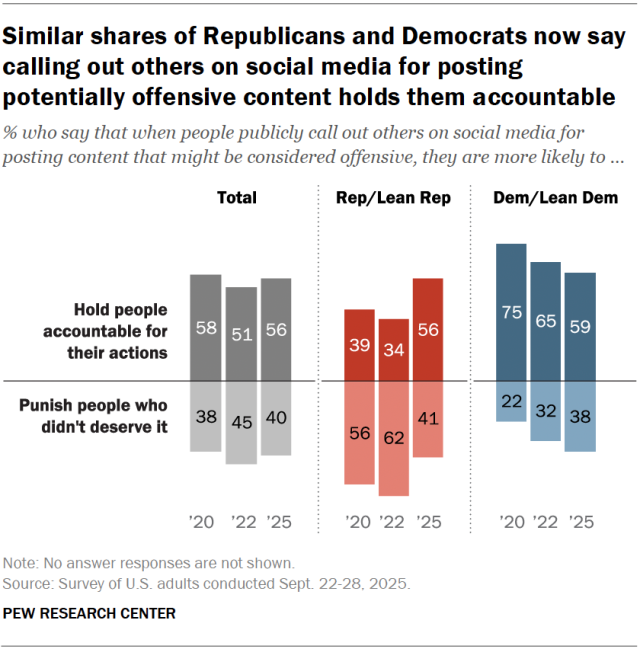☀️ Happy Thursday! The Briefing is your guide to the world of news and information. Sign up here!
In today’s email:
- Featured story: Media outlets including Fox News refuse to sign Pentagon’s press policy
- New from Pew Research Center: How Americans feel about the news they get
- In other news: NBC News Group cuts 2% of workforce before MSNBC and CNBC are spun off
- Looking ahead: Email newsletter 1440 expanding into explainers
- Chart of the week: More Republicans now say calling people out on social media represents accountability
🔥 Featured story
Fox News, the former employer of Defense Secretary Pete Hegseth, joined a group of news outlets refusing to sign the Pentagon’s new press policy that prohibits journalists from gathering or reporting information not officially authorized for release. Several other major TV networks joined Fox News in issuing a statement condemning the new rules as a threat to the free press. And most other outlets credentialed to cover the Pentagon – including Newsmax, The Washington Times and The Daily Caller – turned in their press passes rather than complying with the policy.
A majority of Americans have long said that criticism from news organizations keeps political leaders from doing things that shouldn’t be done. In a 2024 Pew Research Center survey, 74% of U.S. adults affirmed this so-called “watchdog role” for the media.
Many Americans also expressed similar views in a 2025 survey. About seven-in-ten U.S. adults say the people they get news from should definitely (41%) or probably (31%) keep an eye on powerful people. And an even larger share say their news providers should definitely (64%) or probably (20%) correct false or misleading information from public figures.
🚨 New from Pew Research Center
A new analysis of Pew Research Center survey data shows that Americans have mixed emotional responses to the news they get. And those responses vary based on how closely they follow the news.
📌 In other news
- NBC News Group lays off around 150 employees before MSNBC and CNBC are separated from NBC News
- Indiana University orders halt on printing of student newspaper, fires director of student media
- Supreme Court declines Alex Jones’ challenge to $1.4 billion defamation judgment in Sandy Hook case
- Judge temporarily blocks federal agents from using riot control weapons against Chicago journalists covering protests and immigration enforcement efforts
- How President Donald Trump is including friendly media at the White House
- CNN announces “all access” subscriptions at $6.99 per month
- CBS News news standards chief departs
- Italian news publishers call for investigation into Google AI Overviews’ digital traffic impact
📅 Looking ahead
The email newsletter 1440 has generated 4.5 million newsletter subscribers since its launch in 2017 with its daily news curation model. Three-in-ten Americans say they get at least sometimes from email newsletters, according to a recent Center survey, including 6% who say they do so often.
Now, 1440 is adding a growing collection of news explainers on topics it thinks readers want to know more about. Its CEO, Tim Huelskamp, praised the work of journalists doing original reporting, but also said that “no one can find” their stories and that “someone needs to be the connective tissue in the industry.”
Americans are split on whether people who do that kind of news curation are “journalists,” reflecting broader uncertainty about what the term means in the digital era. Four-in-ten U.S. adults say they do not consider someone who primarily compiles and shares other people’s reporting on current events to be a journalist, while 36% they do think of that person as a journalist. An additional 23% say they aren’t sure.
Opinions are also divided on whether someone who writes their own newsletter about news is a journalist, although the balance tilts slightly in the other direction, with more Americans saying that person is a journalist (40%) than isn’t (34%).
📊 Chart of the week
This week’s chart looks at a shift in views: More Republicans now say calling people out on social media represents accountability. A majority of U.S. adults (56%) say that those who call out others on social media for posts that might be considered offensive are mainly holding people accountable for their actions, according to a September Center survey. A smaller share (40%) say those who do this are more likely to punish people who don’t deserve it.
Both in 2022 and 2020, Democrats were more likely than Republicans to see users posting these callouts as mainly holding people accountable. Today, however, the partisan gap in these views has essentially disappeared.

👋 That’s all for this week.
The Briefing is compiled by Pew Research Center staff, including Naomi Forman-Katz, Jacob Liedke, Christopher St. Aubin, Luxuan Wang, Emily Tomasik and Joanne Haner. It is edited by Michael Lipka and copy edited by Mia Hennen.
Do you like this newsletter? Email us at info@pewresearch.org or fill out this two-question survey to tell us what you think.